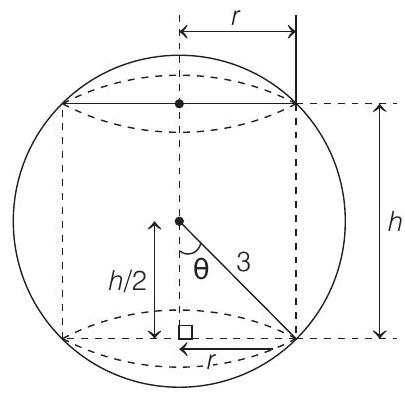Application of Derivatives 4 Question 4
4. If
(a) four rational numbers
(2019 Main, 9 April I)
(b) two irrational and two rational numbers
(c) four irrational numbers
(d) two irrational and one rational number
Show Answer
Answer:
Correct Answer: 4. (d)
Solution:
- The non-zero four degree polynomial
where,
[integrating both sides]
where,
Now, since
Thus,
Key Idea
(i) Use formula of volume of cylinder,
(ii) For maximum or minimum, put first derivative of
Let a sphere of radius 3 , which inscribed a right circular cylinder having radius
From the figure,
and

From Eqs. (i) and (ii), we get






